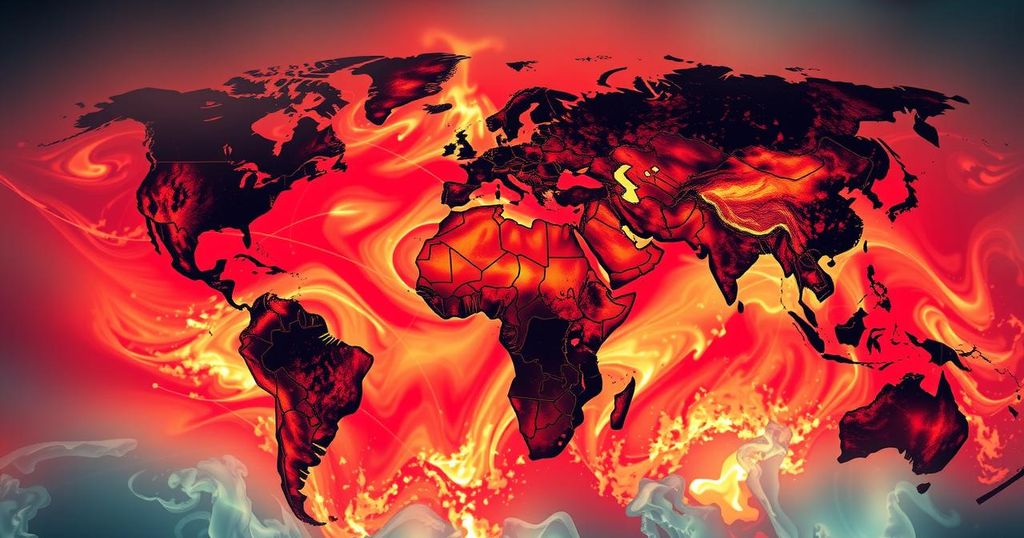In 2024, an analysis revealed that human-related climate change contributed to 41 extra days of dangerous heat globally, exacerbating extreme weather events and threatening vulnerable communities. Researchers found a direct correlation between climate change and numerous deadly weather occurrences. The impending risk of surpassing the Paris Agreement’s temperature limits highlights the urgency for immediate action to combat climate change effects.
In 2024, climate change significantly impacted global temperatures, resulting in an average of 41 additional days of dangerous heat worldwide. This revelation stems from a collaborative analysis by scientists from World Weather Attribution and Climate Central, indicating that human-induced climate change exacerbated extreme weather patterns throughout the year. As the planet experiences unprecedented heat events and an array of severe weather, experts continue to emphasize the relentless upward trajectory of global temperatures due to fossil fuel consumption.
The analysis highlighted that regions such as Northern California, Death Valley, and parts of Mexico faced extreme daytime heat, while vulnerable populations, including children in West Africa, suffered immensely. Furthermore, the soaring temperatures across southern Europe led to the closure of historical sites like the Acropolis. With a relentless 13-month streak of record-breaking heat, 2024 is poised to rank as the hottest year on record, prompting concerns about the implications for human health and environmental stability.
Researchers utilized peer-reviewed methods to compare the 2024 temperatures with predictions made for a world devoid of climate change influence. This data revealed alarming trends, with certain areas experiencing over 150 days of extreme heat attributed to climate change. Those nations most affected are often the poorest and least developed, suffering disproportionately from heat-related challenges.
Friederike Otto, lead scientist at World Weather Attribution, expressed the grim reality, stating, “Climate change did play a role, and often a major role in most of the events we studied.” Moreover, she lamented the silent crisis of heat-related mortality, emphasizing that while death from heat waves can be mitigated, the lack of awareness hampers effective prevention efforts. Otto stressed, “Heat waves are by far the deadliest extreme event, and they are the extreme events where climate change is a real game changer.”
The findings reveal a troubling portent for future climate stability, as the planet edges closer to breaching the Paris Agreement’s target of 1.5 degrees Celsius warming. An analysis of 29 extreme weather events in 2024 that resulted in significant fatalities highlighted a striking 26 events directly correlated with climate change influence. The El Niño phenomenon, which typically augments global temperature averages, was present this year but overshadowed by the more significant repercussions of climate change, particularly warmer oceans fueling severe storms.
In response to these alarming trends, experts advocate for immediate action to mitigate climate change’s destructive impacts. They emphasize the importance of preparedness and adaptation strategies specific to each country’s challenges. Julie Arrighi from the Red Cross Red Crescent Climate Centre reinforced this sentiment, noting that proactive measures could significantly lessen the adverse effects associated with climate change. The rising concentration of greenhouse gases necessitates urgent global collaboration to safeguard communities and the environment.
The ongoing issue of climate change has become increasingly urgent as its effects manifest in extreme weather patterns and rising global temperatures. Specifically, the year 2024 has seen record-breaking heat, prompting scientific analysis to understand the role human activity plays in exacerbating these conditions. Researchers emphasize that reliance on fossil fuels and greenhouse gas emissions are the primary drivers behind this contemporary environmental crisis, leading to devastating impacts on public health, agricultural productivity, and overall planetary health.
The increase of 41 days of dangerous heat due to human-induced climate change in 2024 serves as a stark reminder of the urgent need for collective action to combat climate change. The analysis of extreme weather reveals a direct correlation between rising temperatures and devastating weather patterns, with severe repercussions for vulnerable populations. The findings underscore the critical message that significantly reducing fossil fuel usage and enhancing adaptation strategies are essential in mitigating the growing threats posed by climate change.
Original Source: abcnews.go.com






